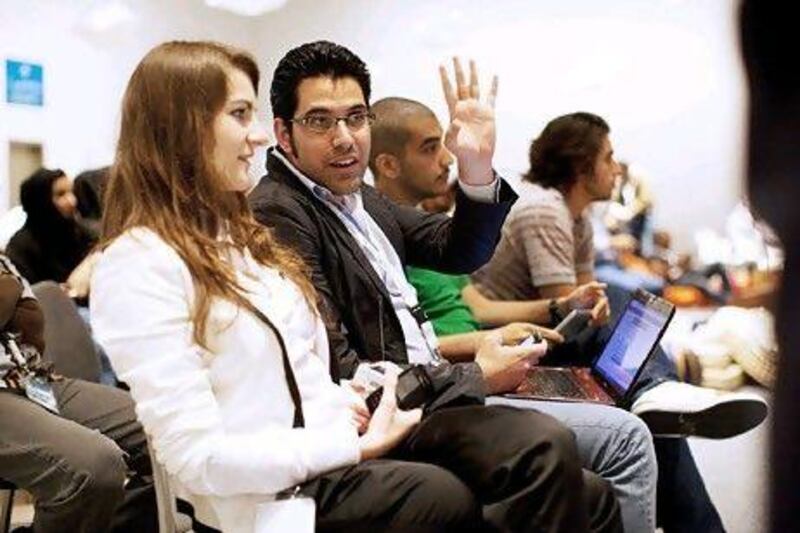When Salim Akil launched his e-commerce business in Damascus in 2007, Syria was booming and so was his website. But five years later, Mr Akil sits in Dubai facing an uncertain future.
Like many other businessmen in Syria, he has been forced to leave the country and his business behind, and faces the arduous task of reinventing himself in a whole new setting.
"I lost my team, who were really good and were encouraged to push the business as a start-up, and now I'm left by myself," he said.
It is a big comedown for the entrepreneur, who had a thriving business in Damascus before the uprising.
"The Syrian business community did well under the economic reforms, but of course now with the current situation, more than a year in conflict, the economic environment has been hard to navigate," said Anthony Skinner, the head of Middle East and North Africa operations with the risk analysis firm Maplecroft.
As money poured into Damascus after the liberalisation of the banking sector, Mr Akil set up www.searchinsyria.com, a site he describes as Syria's equivalent to Alibaba.com.
The website connected small businesses to each other, allowing them to publish their profiles and post images and videos of their products. At its peak, the site had about 3,500 registered users, each paying an annual subscription of US$100 (Dh367), a fraction of what Alibaba charges.
It was a time in Damascus when many start-ups were suddenly able to borrow money, make foreign currency transactions and apply for letters of credit after Bashar Al Assad, the president, loosened his tight control over the economy.
"I established the site because online marketing virtually didn't exist in Syria," he said. "My website opened new channels for Syrian businesses when many were thinking about e-commerce and attracting clients online, similar to Dubai."
The business was so successful that in 2010 he considered launching a second site, www.searchinmena.com, a business-to-business platform for the Arab world. But the tides of fortune immediately turned once the uprisings began in Tunisia and Egypt.
"Start-up businesses are usually the first to get hit when market conditions go sour," said Mr Akil. "All of a sudden, the civil uprising contagion caused my subscribers to stop paying their subscriptions. Everyone was watching and waiting with the expectation that something will happen in Syria."
By February last year, shortly before the uprisings reached Syria, Mr Akil decided the business model was no longer working, because nobody was going to pay for the subscription as sales ground to a halt.
"When the revolution started in Syria and gradually started taking its toll, it slowly dawned on me that I cannot continue doing business here," said Mr Akil. "I stopped working for about six months to consider what my next move will be."
About 90 per cent of the registered small businesses have defaulted on their subscriptions, while many of them have shut down, as Syria's economy collapses under the weight of international sanctions and the uprising, which has gone on for more than a year.
"The turbulence that persists has affected the demand in virtually all areas of the economy, leading to a dramatic souring of the business climate," said Maplecroft's Mr Skinner. "The economy is on its last legs, but of course Syrian authorities don't want to reveal how bad things are for Syria."
Sufian Allaw, Syria's oil minister, said last week that sanctions had cost the country $4 billion.
"Syrian companies have stopped paying their fees and I have stopped bothering to ask them for the money, to be honest," said Mr Akil. "The ones that renewed their registrations are companies that have moved their businesses to Egypt, the UAE, Saudi Arabia or Turkey, but even they are facing a tough time, struggling to move their goods and services from Syria when currency remittances and trade has all come to a halt."
The www.searchinsyria.com website continues to run, and members continue to post their products, although sales have stopped. Last September Mr Akil applied for a free-zone licence from Fujairah and in October set up an office in Dubai with the hopes of attracting clients from the GCC to register for his www.searchinmena.com site.
"It has been really difficult, as one would imagine when moving to a new country, entering a new market, getting a decent valuation on the company when most investors have lost trust in Syrian businesses," Mr Akil said.
Both of his sites are outsourced to a Web development company in Syria, whose staff are working from home and who routinely sufferinternet service disruptions. At times, it can take days to resolve technical problems.





